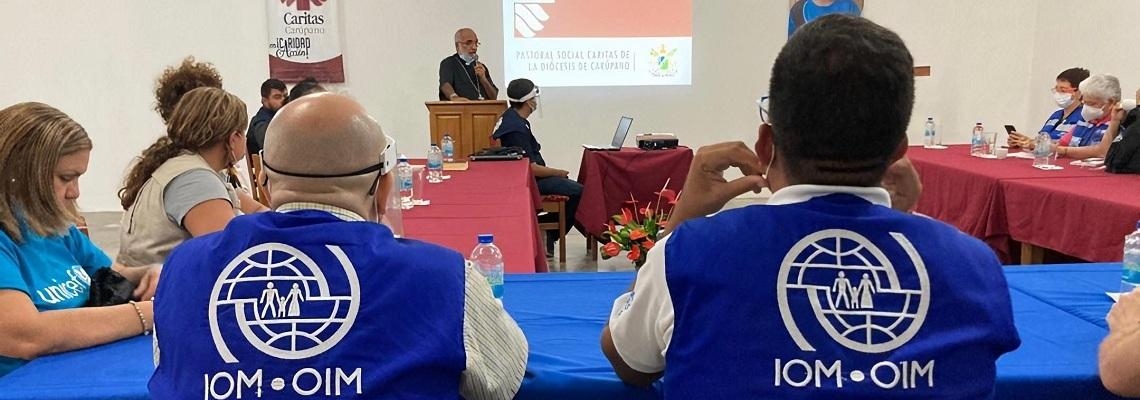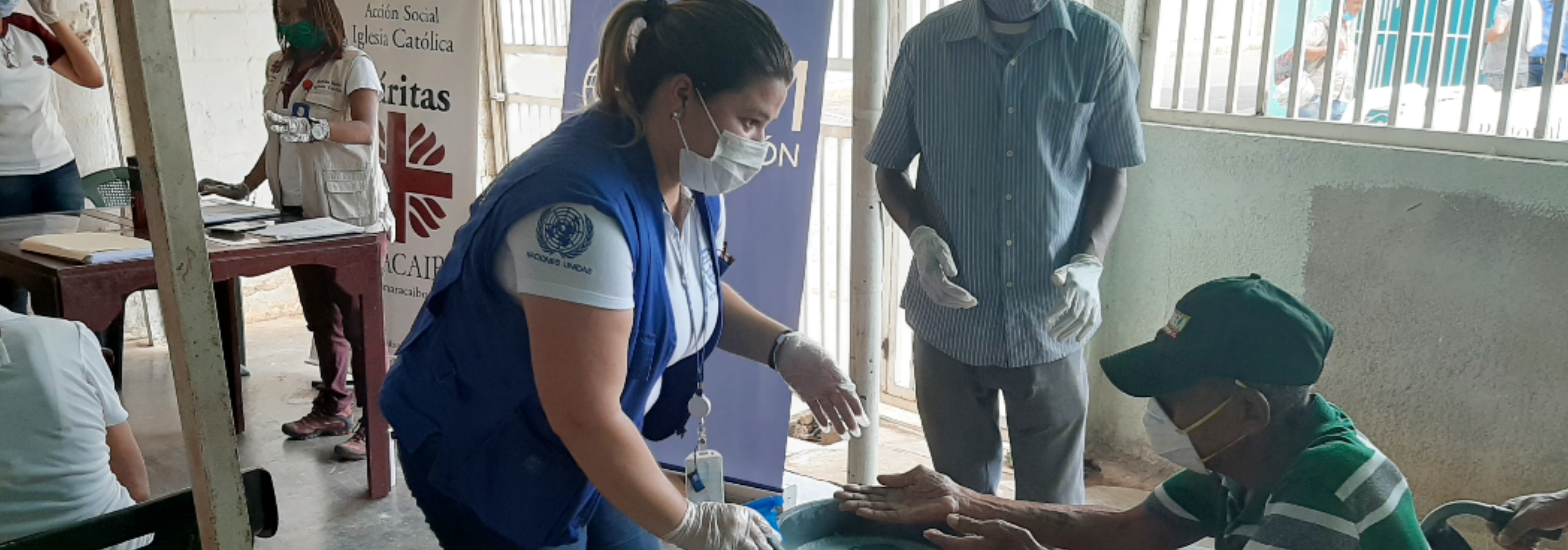IOM Vision
Since 2004, IOM Venezuela has provided life-saving assistance and early-recovery and resilience programmes inside Venezuela for migrants and forcibly displaced populations, affected by the complex crisis of Colombia and Venezuela, as well as for the communities which host them. IOM's interventions will be multi-sectoral in nature, responding to the needs and priorities of affected populations and leveraging IOM's operational presence, technical expertise and strong relationships with national and local authorities. In addition, IOM will be working to limit the humanitarian and socioeconomic effects of the pandemic, and support affected communities to prepare for longer-term recovery.
Objective
Saving lives and protecting people on the move
Vulnerable people and communities in need, with a particular focus on women, girls, the elderly, victims of trafficking and people with disabilities are the beneficiaries targeted by IOM in Venezuela. IOM will also ensure that indigenous communities are reached through life-saving assistance. In response to COVID-19, frontline health centres and institutions will benefit from IOM activities.
In order to address the protection needs of the affected population, IOM activities will include:
- Establishment and management of safe spaces for women and girls in communities with high rates of reported protection incidents and risks, in order to socialize and re-build their social networks, receive social support, acquire contextually relevant skills, and receive information on issues relating to women’s rights, health, and services.
- Provision of access to safe specialized multi-sectoral case management services to gender-based violence (GBV) survivors, victims of trafficking (VoT) and any other form of exploitation and/or abuse in the safe spaces.
- Establishment of a referral system to specialized services in coordination with other protection actors in the targeted areas, providing specialized care, specifically health and legal services. Beneficiaries of protection assistance (the above mentioned safe spaces and case management) will include vulnerable households, focusing as well on single heads of households and the large number of elderly and children whose main financial providers have left the country and are currently in a very vulnerable situation through psychosocial care and training sessions on issues related to GBV, human trafficking and smuggling, sexual and other forms of abuse and exploitation in the communities. The protection assistance provided through this activity will be tailored based on the needs of each household.
- Strengthening of the capacities of community leaders in identifying risks and facilitating access to services by providing information on available services, and of other GBV front line actors, including local NGOs and government actors providing specialized GBV services, including health, and safe shelters. Such actors will be trained through selected implementing partners.
- Facilitation of access to documentation and life-saving information to the vulnerable population. Dissemination of life-saving information related to protection risks and its mitigation in transit and temporary accommodation centres, as well as in communities. This includes information on GBV risk mitigation, trafficking and smuggling, sexual and labour exploitation and other forms of abuse, updated information on available services and ways to mitigate risks. Development of messaging on GBV by GBV specialists. Provision of information and orientation on access to documentation in the country to vulnerable Venezuelans.
- Establishment of a safer environment in local communities through sensitization campaigns on GBV risk mitigation, trafficking, and other forms of exploitation and abuse in areas of origin and transit in order to reach out to groups of different age, gender, and vulnerabilities.
|
|
In order to meet the water, sanitation and hygiene requirements of the affected population, IOM activities will include:
|
|
In order to meet the shelter and NFI needs of the affected population, IOM activities will include:
|
In order to meet the basic needs of the affected population, IOM activities will include:
- Provision of food supplies to vulnerable Colombian refugees, asylum seekers and members of host communities in targeted Venezuelan States.
In order to meet the needs of the affected population, IOM activities will include:
- Improvement of living conditions and safe access to goods and essential services to people on the move, including vulnerable populations in temporary accommodation centres. (Moved from Shelter, settlements and NF

Objective
Driving solutions to displacement
Vulnerable people and communities in need, with a particular focus on women, girls, the elderly and people with disabilities, who respond to the minimum requirements by IOM in order to carry out livelihood projects (ownership of a piece of land, access to water, minimum capacities and motivation).
When it comes to community stabilization efforts, IOM activities will include:
- Implementation of community food security grants, as a sustainable alternative for local food production, promoting at the same time integration between people on the move and host communities decreasing the number of households in which some members skip meals due to scarcity of food.
- Improvement of agricultural livelihoods, by developing community food security initiatives and social participation networks to strengthen social cohesion, promote self-help in communities, improving the capacities of adaptation and resilience.
- Provision of material and technical assistance to generate adaptation mechanisms for families in prioritized communities, which will allow the promotion of small-scale production to have better access to a self-sufficient and healthy diet. Provision of seeds, agricultural tools, accompanied by trainings on productive, associative, nutritional topics, and water harvesting techniques.
Objective
Contribute to an evidence-based and efficient crisis response system
Entities targeted include relevant stakeholders, including governments institutions, working groups such as Information Management Working Groups, Field Coordination Group, Interagency Coordination Groups, donors, UN agencies and forums, and humanitarian and development actors in Venezuela and in the region that will make use of MTM products and the data collected through assessments.
|
To address the information needs of the overall humanitarian response in Venezuela, IOM activities will include:
|
Venezuela (Bolivarian Republic of)
The map used here is for illustration purposes only. Names and boundaries do not imply official endorsement or acceptance by IOM.
Figures are as of 31 December 2023. For more details of IOM's operational capacity in country, please see the IOM Capacity section.













